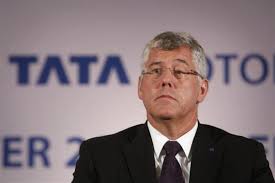 New Delhi, Jan 27: Slym, 51, was in Thailand to attend a meeting of the board of directors of Tata's subsidiary in the country.
New Delhi, Jan 27: Slym, 51, was in Thailand to attend a meeting of the board of directors of Tata's subsidiary in the country.
He had joined the company in October 2012, as part of a major management overhaul that also saw two other top-level appointments, and was the brainchild in the company's strategy to regain its position in the domestic market. His demise is likely to be a speed breaker in that process.
“I am deeply saddened to inform you about the untimely and tragic demise of our company’s Managing Director, Karl Slym. Karl was visiting Bangkok for a meeting of the Board of Directors of Tata Motors Thailand and passed away earlier today,” said Cyrus Mistry, chairman, Tata Group in a statement.
“Karl joined us in October 2012, and was a valued colleague who was providing strong leadership at a challenging time for the Indian auto industry. In this hour of grief, our thoughts are with Karl’s wife and family.”
Though the exact cause of his death will only be clear after post-mortem on Monday, company officials said Slym fell from a higher floor in the hotel he was staying in and that may have caused fatal injuries.
He was accompanied by his wife in Thailand and was expected to return to India on Sunday evening.
Slym, who was earlier the president of General Motors India, between 2007 and 2011, had initiated a slew of measures including a HorizonNext project — a four-pronged customer-focused programme for a complete overhaul of the firm's current product portfolio.
He was also working on sprucing up the Nano to make it more premium to arrest its sliding sales.
Only last week, Tata had launched a more expensive Nano Twist at Rs. 2.36 lakh that came with features like power steering, central locking, power windows and bluetooth connectivity.
Slym is also credited with the next generation petrol engine Revotron that would power most of Tata's coming offerings to redress the company's lack of penetration in the gasoline market.
Currently, petrol engines account for only 15% of Tata's sales.





Comments
Add new comment